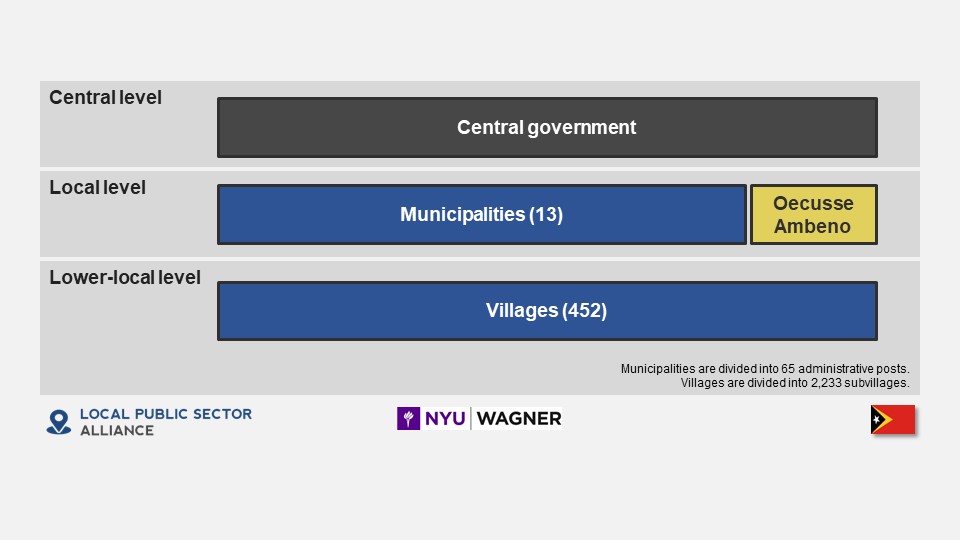
Timor Leste is a country in Southeast Asia, comprising the eastern half of the island of Timor, of which the western half is administered by Indonesia. As a former Portuguese colony (up to 1975) and after Indonesian occupation (1975-1999), Timor Leste adopted its constitution and was recognized as independent in 2002. The 2022 Population and Housing Census recorded a population of 1.3 million residents. Despite its small population, the constitution calls for local governments to be established as corporate bodies vested with representative organs, with the objective of organizing the participation by citizens in solving the problems of their own community and promoting local development without prejudice to the participation by the State. Despite the passage of a Municipal Administrations and Municipal Authorities Act (Decree-Law 3/2016) and the Village (Sucos) Act (2016), in practice, municipalities continue to function as part of the state administration, rather than as truly autonomous local governments.
Subnational government structure
Constitutionally, Timor Leste is a unitary state comprised of two levels of government: central and local. The Constitution leaves the characteristics of the different territorial levels and the administrative competencies of the respective organs up to the legislative framework, although it specifies that Oecusse Ambeno and Ataúro shall enjoy special administrative and economic treatment. After the central level, there are 14 municipalities, 65 administrative posts, 442 villages (sucos), and 2,233 subvillages (aldeias). Since 2015, the municipality of Oecusse Ambeno has special administrative status.
Nature of subnational governance institutions
Even though the constitutional ambition is for municipalities in Timor Leste to become truly devolved local government entities, at the current time, they continue to take on the nature of horizontally (or territorially) deconcentrated entities. The exception to this rule is the Special Administrative Region of Oecusse Ambeno (RAEOA), which can be considered a hybrid local government entity. Villages (and sub-villages) on the other hand, cannot be properly classified as either devolved or deconcentrated local governance entities; while they form mechanisms for public participation, they do not hold any political or authoritative decision-making power on their own.
Functional assignments
The legislative framework assigns several public service competencies to municipalities, including key social services, such as local education, health services, and so on. In practice, however, the bulk of these public services continue to be provided by central line ministries. Average municipal budget allocations account for approximately 3% of the national budget in any given year, with 40-60% of the municipal budgets being allocated to the Secretariat of the Municipal Services.
LoGICA Assessment
LoGICA Intergovernmental Profile: Timor Leste 2023 (Excel)
Additional resources
Timor Leste Population and Housing Census 2022
Timor Leste Women in Local Government (UN Women)
Local Governance in Timor Leste (The Asia Foundation)
Timor Leste Municipality Portal: https://portal.municipio.gov.tl/en/
Back to Local Public Sector Alliance Intergovernmental Profiles – Country Page
Last updated: December 29, 2023
